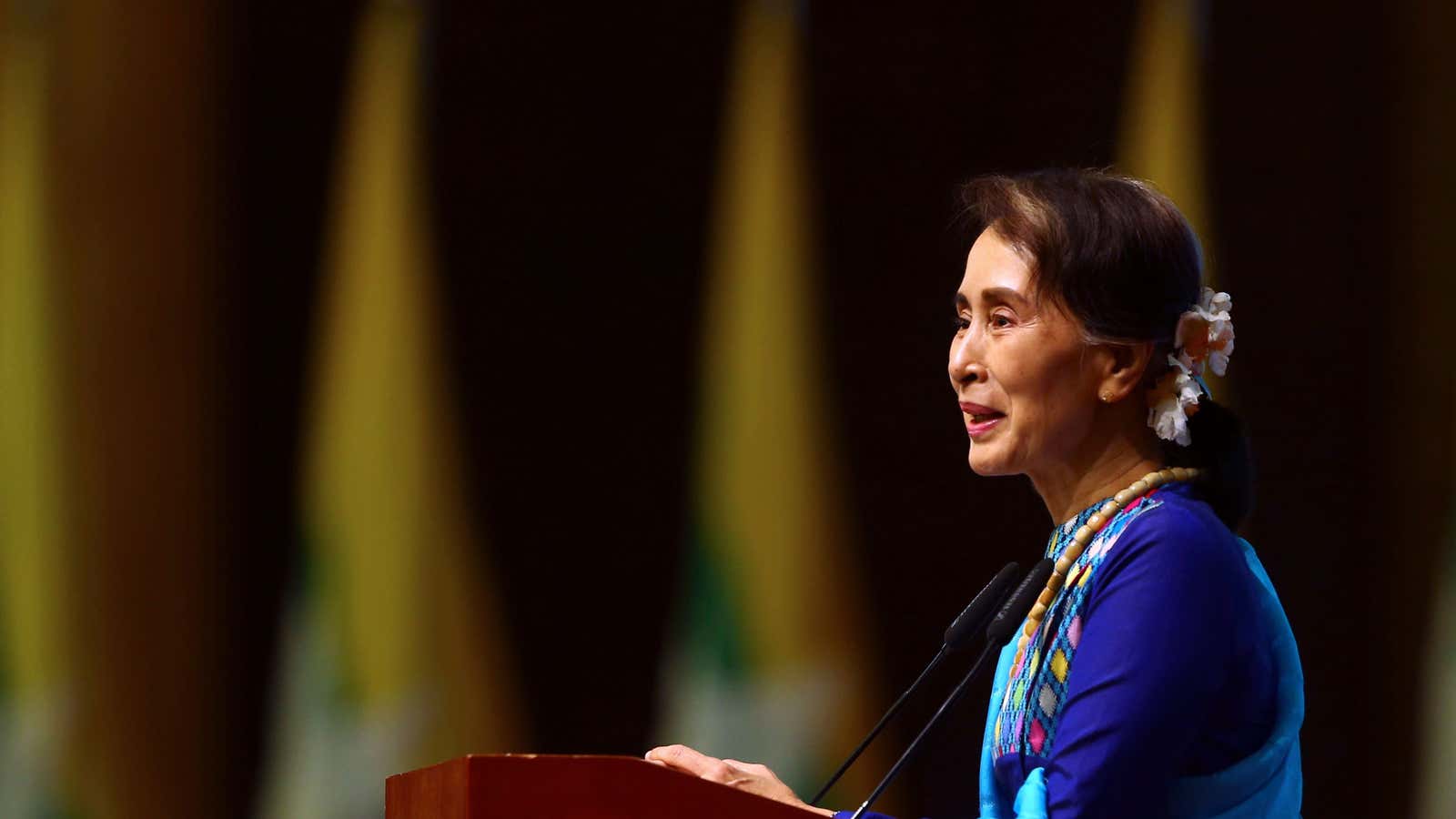A Myanmar judge sentenced two Reuters journalists to seven years in prison today (Sep. 3) in another blow to the country’s faltering democratization. With the verdict now out, some are hoping Myanmar’s de facto leader Aung San Suu Kyi will use her powers to grant amnesty to the reporters.
Wa Lone, 32, and Kyaw Soe Oo, 28, were found guilty of breaching the colonial-era Official Secrets Act, which carries a sentence of up to 14 years in prison. The two, who were reporting on the massacre of the Rohingya Muslim minority, claimed in their defense that they were framed by police who planted classified documents on them.
The reporters testified that two police officers had entrapped them, passing them papers at a restaurant in Yangon only to be arrested moments later by other officers.
A police officer who was called as a witness corroborated the account, noting his commander ordered him to plant the evidence, but he was jailed after his testimony for violating police regulations.
After the verdict, the two men, who have been behind bars for nearly nine months, gave brief statements as they left the courtroom.
“I have no fear,” said Wa Lone. “I have not done anything wrong … I believe in justice, democracy and freedom.”
Added Kyaw Soe Oo: “We were sent to prison to close the eyes and ears of people in Myanmar.”
The world reacts
The case was watched closely by press-freedom advocates around the world, and the UN, European Union, US, and other countries have called for the acquittal of the reporters. Responses to the verdict quickly streamed in after the sentencing.
Reuters’s editor-in-chief Stephen J. Adler called the verdict “a major step backward in Myanmar’s transition to democracy.”
“This amounts to censorship through fear,” said Tirana Hassan, Amnesty International’s director of crisis response.
“The judge has appeared to have ignored evidence and to have ignored Myanmar law,” Britain’s ambassador to Myanmar Dan Chugg added. “This has dealt a hammer blow for the rule of law.”
US ambassador to Myanmar Scot Marciel said, “It’s deeply troubling for everybody who has struggled so hard here for media freedom.”
Brad Adams, Asia director for Human Rights Watch, called into question Myanmar’s transition to democracy under Suu Kyi, the country’s state counsellor and civilian leader: “These sentences mark a new low for press freedom and further backsliding on rights under Aung San Suu Kyi’s government.”
Will Aung San Suu Kyi step in?
There have been indications that Suu Kyi, who had been criticized for her handling of the Rohingya crisis, might grant amnesty to Wa Lone and Kyaw Soe Oo.
Suu Kyi is familiar with the prison where Wa Lone and Kyaw Soe Oo have been detained since Dec. 12, 2017. Insein Prison, which has held many political prisoners over the years including Suu Kyi herself, remains a symbol of oppressive junta rule, and is notorious for inhumane conditions, rioting, and torture.
Given her own long fight for democracy in Myanmar, Suu Kyi’s inaction and silence on the Rohingya crisis have frustrated many and led to calls for her to be stripped of her Nobel peace prize, which she won under house arrest in 1991 (the Nobel committee said last week that it was not possible for someone to be stripped of the prize).
A week ago, a UN fact-finding mission released a report that accused Myanmar’s senior military leaders of having “genocidal intent” and said those leaders must be prosecuted for war crimes. The report also called out Suu Kyi for not using her position, “nor her moral authority, to stem or prevent the unfolding events in Rakhine State.”
But as Aaron Connelly, director of the Southeast Asia Project at the Lowy Institute think tank in Sydney, Australia, pointed out, Suu Kyi could have stepped in long ago in the case of the Reuters journalists as she had for student protestors a year ago.
In a rare public speech last month, Suu Kyi spoke in Singapore about how her relationship with the military was “not that bad” and that the generals in her cabinet were “rather sweet.” Without naming the Rohingya Muslim minority, she justified the military crackdown by citing the threat of terrorism in the country.
